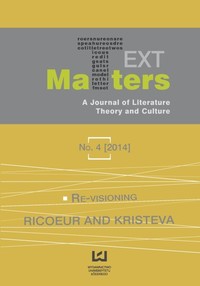“When China Meets China”: Sinéad Morrissey’s Figurations of the Orient, or the Function of Alterity in Julia Kristeva and Paul Ricoeur
DOI:
https://doi.org/10.2478/texmat-2014-0008Abstract
This article attempts to investigate the potential resonances between Paul Ricoeur’s and Julia Kristeva’s theories of otherness as applied to the study of poetry by the Northern-Irish poet Sinéad Morrissey. In all of her five poetry books she explores various forms of otherness and attempts to sketch them in verse. She confronts alterity in many ways, approaching such subjects as the relationship with the body and children, encounters with foreigners, and coming to terms with what is foreign within us. This article engages primarily with her experiences of China, which she recorded in the long poem “China” from her third collection, The State of Prisons (2005). Firstly, this article tackles the question of the body, which is interpreted on the basis of Morrissey’s “post-mortem” poems. Their reading prepares the ground for further explorations of otherness, which Morrissey locates at the very heart of human subjectivity. In this way, she also manages to establish a poetic framework for an ethical consideration of otherness. By investigating the working of the human psyche, Morrissey seems to go along the lines of Kristeva and Ricoeur, who claim that otherness is inextricably linked with the formation of human subjectivity. Taking a cue from their philosophical enquiries, the article also attempts to establish where Kristeva’s and Ricoeur’s philosophies overlap.
Downloads
References
Brandt, Joan. “Julia Kristeva and the Revolutionary Politics of Tel Quel.” Revolt, Affect, Collectivity: The Unstable Boundaries of Kristeva’s Polis. Ed. Tina Chanter and Ewa Płonowska-Ziarek. New York: State UP, 2005. 21-36. Print.
Google Scholar
Kristeva, Julia. About Chinese Women. Trans. Anita Barrows. New York: Urizen, 1986. Print.
Google Scholar
Kristeva, Julia. “The Love of Another Language.” Intimate Revolt: The Powers and Limits of Psychoanalysis. Trans. Jeanine Herman. Vol. 2. New York: Columbia UP, 2002. 240-54. Print.
Google Scholar
Kristeva, Julia. Strangers to Ourselves. Trans. Leon S. Roudiez. New York: Columbia UP, 1991. Print.
Google Scholar
Lee, Kyoo. “The Other of Dialogue: Opening Silences of the Dumb Foreigner.” Social Identities 12.1 (2006): 59-77. Print.
Google Scholar
Levinas, Emmanuel. “The Transcendence of Words.” Trans. Seán Hand. The Levinas Reader. Ed. Seán Hand. Oxford: Blackwell, 1989. Print.
Google Scholar
Morrissey, Sinéad. Between Here and There. Manchester: Carcanet, 2002. Print.
Google Scholar
Morrissey, Sinéad. “Fast Movers: Sinéad Morrissey.” Interview by Annamay McKernan. Tatler Woman. 24 June 2002. Carcanet. Carcanet, 2000-2013. Web. 15 May 2013.
Google Scholar
Morrissey, Sinéad. Interview by Mark Thwaite. Ready Steady Book for Literature. Ready- SteadyBook, 6 Feb. 2006. Web. 15 May 2013.
Google Scholar
Morrissey, Sinéad. The State of Prisons. Manchester: Carcanet, 2005. Print.
Google Scholar
Morrissey, Sinéad. There was Fire in Vancouver. Manchester: Carcanet, 1996. Print.
Google Scholar
Ricoeur, Paul. Oneself as Another. Trans. Kathleen Blarney. Chicago: U of Chicago P, 1994. Print.
Google Scholar
Ricoeur, Paul. On Translation. Trans. Eileen Brennan. London: Routledge, 2006. Print.
Google Scholar
Schupbach, William. “The Double Emblem.” Medical History 26.S2 (1982): 31-40. Cambridge Journals. Cambridge UP, 16 Aug. 2012. Web. 15 May 2013.
Google Scholar
Visker, Rudi. “The Strange(r) Within Me.” Ethical Perspectives: Journal of the European Ethics Network 12.4 (2005): 425-41. Print.
Google Scholar
Ziemba, Antoni. Iluzja a realizm. Gra z widzem w sztuce holenderskiej 1580-1660. Warsaw: WUW, 2005. Print.
Google Scholar
Downloads
Published
How to Cite
Issue
Section
License

This work is licensed under a Creative Commons Attribution-NonCommercial-NoDerivatives 4.0 International License.













